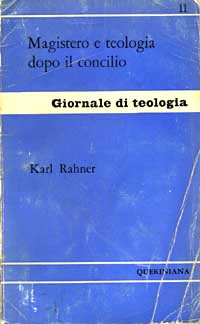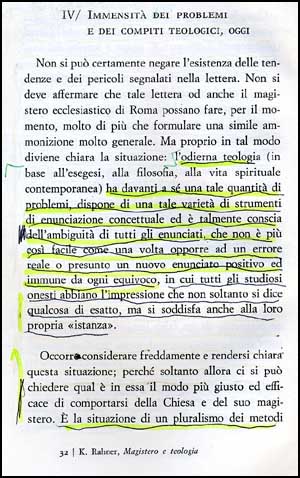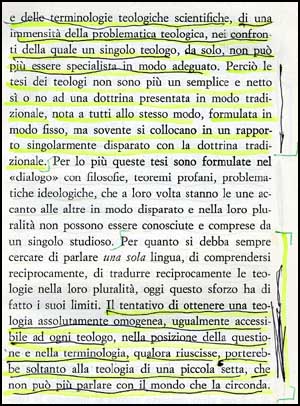Fr. Karl Rahner, S.J. is well known as one of the main thinkers who influenced Vatican II and helped to write its principal documents.
In the text below he declares that the ensemble of the Catholic Faith expressed by traditional Magisterium is no longer an adequate criteria to judge theological theses. To continue to use it as the reference point would characterize the behavior of a "small sect."
At right is the cover of the book Magisterium and Theology after the Council. At right below, photocopies of the Italian text. Below, we present our translation of the lines highlighted in yellow.
Present day theology .... faces so many problems, makes use of such a great variety of tools to enunciate concepts, and is so aware of the ambiguity of all pronouncements, that it is no longer easy, as it was before, to refute a real or supposed error with a new positive declaration immune from any error, giving the impression to honest scholars that it is exact and satisfies their own point of view.
We should consider the situation coldly and clarify it. Only then can we ask what is the more just and efficient way for the Church and her Magisterium to behave.
We have a pluralism of methods and of scientific theological terminology, and an immense number of theological problems. In face of them, a single theologian cannot be sufficiently informed. Hence, the theses of theologians can no longer give a yes or no to a doctrine presented in a traditional way, understood by all in the same way, and formulated in a fixed manner. Often theologians place themselves at complete variance with the traditional doctrine.
Most of their theses are formulated in "dialogue" with philosophies, non-religious concepts, and ideological problems that are, in turn, completely different and cannot be understood in their plurality by a single scholar.
Even though one should always try to speak the same language, understand one another reciprocally, and translate theologies in their plurality, these efforts have limits. Even if it were successful, the attempt to obtain in the realm of questions and terms an absolutely homogeneous theology, equally accessible to every theologian, would only lead to a theology of a small sect that can no longer speak to the world surrounding it.
(Karl Rahner Magistero e Teologia dopo il Concilio, Brescia: Queriniana, 1967, pp. 32-33).
|


 |
